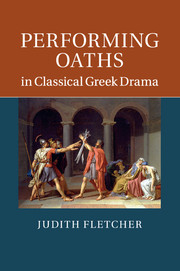Book contents
- Frontmatter
- Contents
- Acknowledgments
- A note on abbreviations
- Introduction
- Chapter 1 From curses to blessings: horkos in the Oresteia
- Chapter 2 Speaking like a man: oaths in Sophocles’ Trachiniae and Philoctetes
- Chapter 3 Horkos in the polis: Athens, Thebes and Sophocles
- Chapter 4 Perjury and other perversions: Euripides’ Phoenissae, Orestes and Cyclops
- Chapter 5 Twisted justice in Aristophanes’ Clouds
- Chapter 6 Women and oaths in Euripides
- Chapter 7 How to do things with Euripides: Aristophanes’ Thesmophoriazusae
- Chapter 8 Swearing off sex: the women's oath in Aristophanes’ Lysistrata
- Conclusion
- Bibliography
- Index locorum
- General index
Introduction
Published online by Cambridge University Press: 05 December 2011
- Frontmatter
- Contents
- Acknowledgments
- A note on abbreviations
- Introduction
- Chapter 1 From curses to blessings: horkos in the Oresteia
- Chapter 2 Speaking like a man: oaths in Sophocles’ Trachiniae and Philoctetes
- Chapter 3 Horkos in the polis: Athens, Thebes and Sophocles
- Chapter 4 Perjury and other perversions: Euripides’ Phoenissae, Orestes and Cyclops
- Chapter 5 Twisted justice in Aristophanes’ Clouds
- Chapter 6 Women and oaths in Euripides
- Chapter 7 How to do things with Euripides: Aristophanes’ Thesmophoriazusae
- Chapter 8 Swearing off sex: the women's oath in Aristophanes’ Lysistrata
- Conclusion
- Bibliography
- Index locorum
- General index
Summary
According to the poet of the epic Titanomachy (fr. 13), it was Chiron who first taught mortals the practice of oath-swearing. With this lesson the wise centaur gave humanity an enduring gift. The oath was a ubiquitous social and religious practice in the ancient Greek world; it governed behavior in the law court, commercial, civic and international relations, and even in private lives. It would be difficult to overestimate the sanctity and influence of this pervasive ritual: “divinely ordained and magically protected,” as Anne Burnett put it, the oath “stood like the primeval pillar that supports the sky.” Consonant with the ancient world's respect for their cultural authority, oaths exercise a powerful narrative and dramatic force in Greek literature from Homer to the Hellenistic poets. Nearly half of extant Greek tragedy, the single surviving satyr play and several Aristophanic comedies feature a formal oath. Yet scholarship has not given this standard element of Greek drama the attention it deserves. The purpose of this book is to respond to that lack. The following chapters investigate the oath as a literary device in the dramas produced in Athens during the fifth century bce. I explore how the oath can mark or structure a dramatic plot, at times compelling characters to act in ways that are contrary to their best interests or even their own moral compunctions. Hippolytus, for example, is bound by oath not to tell the truth that might have saved his life. The reminder of an oath pushes the hesitant Orestes to kill his mother. Characters like Eteocles in Euripides’ Phoenissae or Strepsiades in Aristophanes’ Clouds discover the consequences of forsworn oaths. Oaths also highlight significant moments in a plot and often provide a ceremonial flourish to its resolution: Hyllus swears an oath to his father Heracles at the end of Trachiniae; Athena prescribes an oath to seal the alliance of the Argives and Athenians in the exodus of Euripides’ Supplices. As we are about to see, the Athenian dramatists inherited the oath as a plot device from epic poetry, and they adapted its narrative force in ways that reflected their own political institutions and civic ideology.
- Type
- Chapter
- Information
- Performing Oaths in Classical Greek Drama , pp. 1 - 34Publisher: Cambridge University PressPrint publication year: 2011



